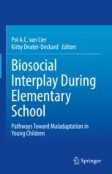Search
Search Results
-
Distractor inhibition by alpha oscillations is controlled by an indirect mechanism governed by goal-relevant information
The role of alpha oscillations (8–13 Hz) in cognition is intensively investigated. While intracranial animal recordings demonstrate that alpha...

-
Theta oscillations and minor hallucinations in Parkinson’s disease reveal decrease in frontal lobe functions and later cognitive decline
Cognitive decline and hallucinations are common and debilitating non-motor symptoms, usually occurring during later phases of Parkinson’s disease...

-
Gamma oscillations of visual cortex underlying emotion and cognition deficits associated with suicide attempt in major depressive disorder
Altered neural oscillations in response to negative or positive emotional stimuli may be related to severe clinical symptoms in patients with major...

-
Increasing coordination and responsivity of emotion-related brain regions with a heart rate variability biofeedback randomized trial
Heart rate variability is a robust biomarker of emotional well-being, consistent with the shared brain networks regulating emotion regulation and...

-

-
Effects of a randomised trial of 5-week heart rate variability biofeedback intervention on mind wandering and associated brain function
Previous research suggests that excessive negative self-related thought during mind wandering involves the default mode network (DMN) core subsystem...

-
Brain stimulation over dorsomedial prefrontal cortex modulates effort-based decision making
Deciding whether to engage in strenuous mental activities requires trading-off the potential benefits against the costs of mental effort, but it is...

-
Acute Bouts of Aerobic Exercise Do Not Modulate Task-Evoked Midfrontal Theta Oscillations in School-Age Children
While acute aerobic exercise has been found to have a facilitative effect on task components with varied cognitive control demands in school-age...

-
Brain-Focused Coaching
Coaching has been widely accepted as an evidence-based intervention to facilitate behavior change and goal attainment. The evidence-based perspective...
-
School Social Relationships and Brain Functioning
The quantity and quality of social experiences with peers are likely to interact with the develo** brain to shape how children respond in peer as...
-

-
The brain structure, immunometabolic and genetic mechanisms underlying the association between lifestyle and depression
Lifestyle factors have been acknowledged to be modifiable targets that can be used to counter the increasing prevalence of depression. This study...

-
“Your Thoughts are (were) Free!“: Brain-Computer-Interfaces, Neurofeedback, Detection of Deception, and the Future of Mind-Reading
This review describes the historical developement and rationale of clinically relevant research on neurophysiological „mind reading“ paradims: Brain-...

-
Brain mechanisms underlying the emotion processing bias in treatment-resistant depression
Depression is associated with a cognitive bias towards negative information and away from positive information. This biased emotion processing may...

-
Ringing Decay of Gamma Oscillations and Transcranial Magnetic Stimulation Therapy in Autism Spectrum Disorder
Research suggest that in autism spectrum disorder (ASD) a disturbance in the coordinated interactions of neurons within local networks gives rise to...

-
Early Behavioral Markers of Anxiety and Reduced Frontal Brain Alpha May Predict High Risk for Bullying Victimization
Bullying victimization has a profound negative impact on a child’s emotional, social, and cognitive development. Childhood bullying victimization is...

-
The efficacy of non-invasive brain stimulation in the treatment of children and adolescents with Anorexia Nervosa: study protocol of a randomized, double blind, placebo-controlled trial
BackgroundCurrent psychological and pharmacological treatments for Anorexia Nervosa (AN) provide only moderate effective support, and there is an...

-
Effects of Heart Rate Variability Biofeedback Training on Anxiety Reduction and Brain Activity: a Randomized Active-Controlled Study Using EEG
Heart rate variability biofeedback (HRVBF) is a promising anxiety-reducing intervention that increases vagally-mediated heart rate variability...

-
Stress effects on the top-down control of visuospatial attention: Evidence from cue-dependent alpha oscillations
Stress is assumed to inhibit the top-down control of attention and to facilitate bottom-up processing. Evidence from human experiments, however,...

-
A further specification of the effects of font emphasis on reading comprehension: Evidence from event-related potentials and neural oscillations
The attention hypothesis, which assumes that font emphasis captures readers’ attention, is usually used to explain the mechanism by which such...

